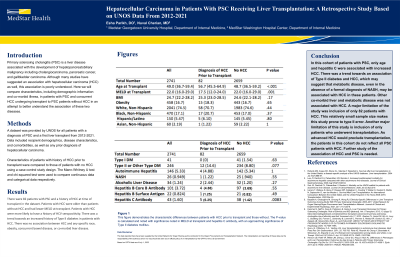Monday Poster Session
Category: Liver
P2393 - Hepatocellular Carcinoma in Patients With PSC Receiving Liver Transplantation: A Retrospective Study
Monday, October 23, 2023
10:30 AM - 4:15 PM PT
Location: Exhibit Hall

Has Audio

Nuval Cherian, MD
MedStar Washington Hospital Center
Washington, District of Columbia
Presenting Author(s)
Nuval Cherian, MD1, Esha Parikh, DO2
1MedStar Washington Hospital Center, Washington, DC; 2MedStar Georgetown University Hospital, Washington, DC
Introduction: Primary sclerosing cholangitis (PSC) is a liver disease associated with the development of hepatopancreatobiliary malignancy including cholangiocarcinoma, pancreatic cancer, and gallbladder carcinoma. Although many studies have suggested an association with hepatocellular carcinoma (HCC) as well, this association is poorly understood. Here we will compare characteristics, including demographic information and co-morbid illness, in patients with PSC and concurrent HCC undergoing transplant to PSC patients without HCC in an attempt to better understand the association of these two diseases.
Methods: A dataset was provided by UNOS for all patients with a diagnosis of PSC and a first liver transplant from 2012-2021. Data included recipient demographics, disease characteristics, and comorbidities, as well as any prior diagnosis of hepatocellular carcinoma.
Characteristics of patients with history of HCC prior to transplant were compared to those of patients with no HCC using a case control study design. The Mann-Whitney U test and chi-squared test were used to compare continuous data and categorical data respectively.
Results: There were 82 patients with PSC and a history of HCC at time of transplant in the dataset. Patients with HCC were older than patients without HCC and had lower MELD at transplant. Patients with HCC were more likely to have a history of HCV seropositivity. There was a trend towards an increased history of Type II diabetes in patients with HCC. There was no association between HCC and any specific race, obesity, concurrent bowel disease, or co-morbid liver disease.
Discussion: In this cohort of patients with PSC, only age and hepatitis C were associated with increased HCC. There was a trend towards an association of Type II diabetes and HCC, which may suggest that metabolic disease, even in the absence of a formal diagnosis of NASH, may be associated with HCC in these patients. Other co-morbid liver and metabolic disease was not associated with HCC. A major limitation of the study was inclusion of only 82 patients with HCC. This relatively small sample size makes this study prone to type II error. Another major limitation of this study is inclusion of only patients who underwent transplantation. As advanced HCC would preclude transplantation, the patients in this cohort do not reflect all PSC patients with HCC. Further study of the association of HCC and PSC is needed.
Disclosures:
Nuval Cherian, MD1, Esha Parikh, DO2. P2393 - Hepatocellular Carcinoma in Patients With PSC Receiving Liver Transplantation: A Retrospective Study, ACG 2023 Annual Scientific Meeting Abstracts. Vancouver, BC, Canada: American College of Gastroenterology.
1MedStar Washington Hospital Center, Washington, DC; 2MedStar Georgetown University Hospital, Washington, DC
Introduction: Primary sclerosing cholangitis (PSC) is a liver disease associated with the development of hepatopancreatobiliary malignancy including cholangiocarcinoma, pancreatic cancer, and gallbladder carcinoma. Although many studies have suggested an association with hepatocellular carcinoma (HCC) as well, this association is poorly understood. Here we will compare characteristics, including demographic information and co-morbid illness, in patients with PSC and concurrent HCC undergoing transplant to PSC patients without HCC in an attempt to better understand the association of these two diseases.
Methods: A dataset was provided by UNOS for all patients with a diagnosis of PSC and a first liver transplant from 2012-2021. Data included recipient demographics, disease characteristics, and comorbidities, as well as any prior diagnosis of hepatocellular carcinoma.
Characteristics of patients with history of HCC prior to transplant were compared to those of patients with no HCC using a case control study design. The Mann-Whitney U test and chi-squared test were used to compare continuous data and categorical data respectively.
Results: There were 82 patients with PSC and a history of HCC at time of transplant in the dataset. Patients with HCC were older than patients without HCC and had lower MELD at transplant. Patients with HCC were more likely to have a history of HCV seropositivity. There was a trend towards an increased history of Type II diabetes in patients with HCC. There was no association between HCC and any specific race, obesity, concurrent bowel disease, or co-morbid liver disease.
Discussion: In this cohort of patients with PSC, only age and hepatitis C were associated with increased HCC. There was a trend towards an association of Type II diabetes and HCC, which may suggest that metabolic disease, even in the absence of a formal diagnosis of NASH, may be associated with HCC in these patients. Other co-morbid liver and metabolic disease was not associated with HCC. A major limitation of the study was inclusion of only 82 patients with HCC. This relatively small sample size makes this study prone to type II error. Another major limitation of this study is inclusion of only patients who underwent transplantation. As advanced HCC would preclude transplantation, the patients in this cohort do not reflect all PSC patients with HCC. Further study of the association of HCC and PSC is needed.
Disclosures:
Nuval Cherian indicated no relevant financial relationships.
Esha Parikh indicated no relevant financial relationships.
Nuval Cherian, MD1, Esha Parikh, DO2. P2393 - Hepatocellular Carcinoma in Patients With PSC Receiving Liver Transplantation: A Retrospective Study, ACG 2023 Annual Scientific Meeting Abstracts. Vancouver, BC, Canada: American College of Gastroenterology.
